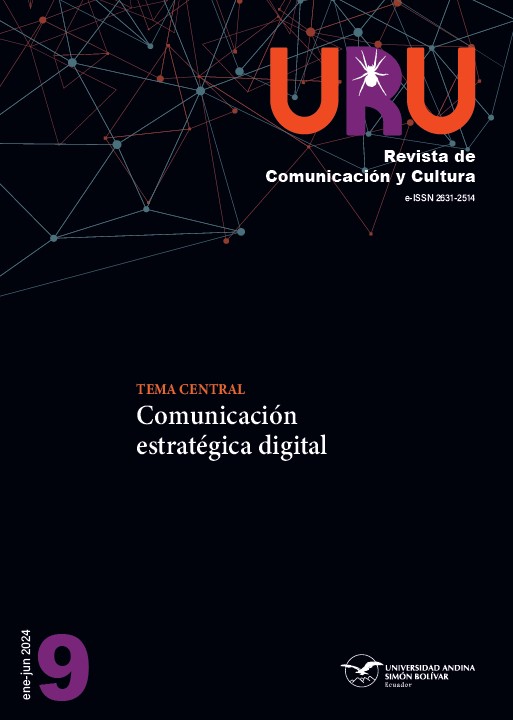Post-Truth as a Social Discourse and Product of Hegemony
DOI:
https://doi.org/10.32719/26312514.2024.9.7Keywords:
Truth, post-truth, social discourse, hegemonyAbstract
Post-truth is a concept that describes the trend in which emotions and personal beliefs influence public opinion more than objective facts and verifiable evidence. In the age of digital information and social media, post-truth has become more relevant, as misinformation and fake news can spread quickly, making it difficult to discern truth from falsehood. This phenomenon poses significant challenges to informed decision-making and trust in the media and institutions.
This text analyzes the contribution of the work of Marc Angenot, semiologist and literary critic, which is based on deep semiotic and rhetorical research to identify discursive patterns, persuasion strategies and the evolution of political discussions in that historical period. His work highlights the importance of speeches in the transformation of society and the creation of a new political consciousness. Furthermore, Angenot establishes a typology of discourses that has been influential in the study of rhetoric and political communication.
Downloads
References
Alvarez Rufs, Manuel. 2018. “Estado del arte: Posverdad y fake news”. Tesis de maestría, Universidad Nacional de Educación a Distancia, España. https://tinyurl.com/yk826dsj.
Angenot, Marc. 2010. El discurso social: Los límites históricos de lo pensable y lo decible. Buenos Aires: Siglo XXI.
—. 2023. “La noción de arsenal argumentativo: La inventividad retórica en la historia”. Marc Angenot. Accedido 28 de noviembre. https://tinyurl.com/y64c4apz.
Aristóteles. 1994. Metafísica. Madrid: Gredos.
Avaro, Dante. 2021. “La posverdad: Una guía introductoria”. Andamios 18 (46): 117-42. https://tinyurl.com/4t5eah5p. DOI: https://doi.org/10.29092/uacm.v18i46.840
Aznar, Federico. 2018. “El mundo de la posverdad”. Cuadernos de Estrategia 197: 21-82. https://tinyurl.com/rfrazkjy.
Blanco, Ignacio. 2020. “Posverdad, percepción de la realidad y opinión pública: Una aproximación desde la fenomenología”. Revista de Estudios Políticos 187: 167-86. https://tinyurl.com/5n8et7nb. DOI: https://doi.org/10.18042/cepc/rep.187.06
Delupi, Baal. 2021. “La teoría del discurso social de Marc Angenot”. Andamios 18 (47): 65-82. https://tinyurl.com/2k3kn9dy. DOI: https://doi.org/10.29092/uacm.v18i47.866
Ferraris, Maurizio. 2019. Posverdad y otros enigmas. Madrid: Alianza Editorial.
Fowks, Jacqueline. 2018. Mecanismos de la posverdad. Ciudad de México: Fondo de Cultura Económica.
Fuller, Steve. 2018. “What Can Philosophy Teach Us About the Post-Truth Condition”. En Post-Truth, Fake News: Viral Modernity & Higher Education, editado por Michael Peters, Sharon Rider, Mats Hyvo?nen y Tina Besley, 13-26. Singapur: Springer. https://tinyurl.com/855kdssa. DOI: https://doi.org/10.1007/978-981-10-8013-5_2
González Arocha, Jorge. 2021. “El posmodernismo y el realismo en la aporía de la posverdad”. Sophia. Colección de Filosofía de la Educación 31: 89-111. https://tinyurl.com/49u2nwxr. DOI: https://doi.org/10.17163/soph.n31.2021.03
Hazard-Owen, Laura. 2017. “Noticias reales sobre noticias falsas: Facebook se asocia con ma?s sitios de fact-checking”. NiemanLab. 4 de agosto. https://tinyurl.com/6scve5zx.
Herreras, Enrique, y Marina Garci?a. 2020. “Sobre verdad, mentira y posverdad: Elementos para una filosofía de la información”. Bajo Palabra 24: 157-76. https://doi.org/10.15366/bp.2020.24.008. DOI: https://doi.org/10.15366/bp.2020.24.008
Ibáñez Fanés, Jordi, ed. 2017. En la era de la posverdad: Catorce ensayos. Barcelona: Calambur.
Islas, Damián. 2021. “La teori?a correspondentista de la verdad y la confirmación científica”. Sophia. Colección de Filosofía de la Educacio?n 31: 65-87. https://doi.org/10.17163/soph.n31.2021.02. DOI: https://doi.org/10.17163/soph.n31.2021.02
Llorente, José Antonio. 2017. “La era de la posverdad: Realidad vs. percepción”. UNO 27: 8-16. https://tinyurl.com/5n7fp75f.
McIntyre, Lee. 2018. Posverdad. Madrid: Cátedra.
Morales, Estela, coord. 2018. La posverdad y las noticias falsas: El uso ético de la información. Ciudad de México: Universidad Nacional Autónoma de México.
Nigro, Patricia. 2023. “La posverdad en el discurso público: Análisis de formas de manipulación lingüística”. Academia. Accedido 28 de noviembre. https://tinyurl.com/yc8jvbm2.
Peleteiro, Berenguela, y Aurora García. 2019. “El fenómeno de la posverdad: La manipulación de la opinión pública en la era del relativismo y las ciberdemocracias”. En Las nuevas narrativas, en el entorno social, editado por Vanessa Rodríguez, Milena Trenta, Samuel Toledano, Ciro Hernández, Alberto Ardèvol, Alejandro Álvarez, Lucas Morales, Tatiana Hidalgo y Almudedna Barrientos. Tenerife, ES: Universidad de La Laguna. DOI: https://doi.org/10.4185/cil2019-103
Ramos, Alejandro. 2018. “Información líquida en la era de la posverdad”. Revista General de Información y Documentación 28 (1): 283-98. https://tinyurl.com/yetmzc3z. DOI: https://doi.org/10.5209/RGID.60809
Sánchez Cotta, Agustín. 2019. “Sobre verdad y posverdad en sentido social”. Ámbitos. Revista Internacional de Comunicacio?n 45: 224-37. http://dx.doi.org/10.12795/AMBITOS. DOI: https://doi.org/10.12795/Ambitos.2019.i45.13
Schutijser, Dennis. 2022. “Afrontar la posverdad desde un fundamento neoaristotélico de la educación”. Sophia. Colección de Filosofía de la Educacio?n 32: 225-43. https://doi.org/10.17163/soph.n32.2022.07. DOI: https://doi.org/10.17163/soph.n32.2022.07
Vila de Prado, Roberto. 2018. “La posverdad y la espiral del silencio”. Revista Aportes de la Comunicacio?n y la Cultura 24: 9-19. https://tinyurl.com/bdzh2jny. DOI: https://doi.org/10.56992/a.v1i24.66
Downloads
Published
How to Cite
Issue
Section
License
Copyright (c) 2024 Uru: Revista de Comunicación y Cultura

This work is licensed under a Creative Commons Attribution-NonCommercial-ShareAlike 4.0 International License.
ASSIGNMENT OF RIGHTS, DECLARATION OF CONFLICT OF INTEREST AND DISSEMINATION
The authors who publish in this journal accept the following conditions:
- Authors retain copyright and grant the journal the right of first publication, with the work registered under the Creative Commons Attribution-NonCommercial-ShareAlike 4.0 License, which allows sharing, adapting and attributing the work (see: Open Access Policies).
- Authors can make other independent and additional contractual agreements for the distribution of the article published in this journal (e.g., include it in an institutional repository or publish it in a book) as long as they expressly indicate that the article was published for the first time in Uru: Revista de Comunicación y Cultura. In the case of reproduction, a note similar to the following must be included: This text was originally published in the journal Uru: Revista de Comunicación y Cultura N ° -, year of publication.
- Authors are encouraged to publish their work on the Internet (e.g. on institutional or personal pages) in the final version published by Uru: Revista de Comunicaicón y Cultura as it may lead to a wider and faster dissemination of the published work.








